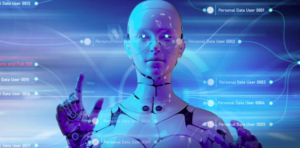In today’s rapidly evolving digital landscape, businesses across various sectors are experiencing a paradigm shift known as digital transformation. This transformation is significantly driven by the advent of Artificial Intelligence (AI), which is revolutionizing marketing strategies and IT infrastructure. The integration of AI in these domains is not only enhancing efficiency but also paving the way for innovative solutions that are reshaping business operations.
The Role of AI in Digital Transformation:
Digital transformation involves leveraging emerging technologies to fundamentally alter how organizations operate and deliver value to customers. Among these technologies, Artificial Intelligence stands out as a catalyst for change. AI encompasses a range of technologies, including Machine Learning, Deep Learning, and Big Data analytics, which collectively empower businesses to automate processes, derive insights, and make informed decisions.

AI in Marketing:
AI’s impact on digital marketing is profound. Traditional marketing strategies are being replaced by AI-driven approaches that offer more personalized and targeted campaigns. AI in marketing utilizes machine learning algorithms to analyze consumer behavior, predict trends, and tailor content to individual preferences. This level of personalization enhances customer engagement and drives higher conversion rates.
For instance, AI-powered tools can analyze vast amounts of data from social media, emails, and website interactions to create comprehensive customer profiles. These profiles enable marketers to deliver relevant content and offers, improving the overall customer experience. Additionally, chatbots and virtual assistants, powered by AI, provide real-time customer support, further enhancing customer satisfaction.
Revolutionizing IT Infrastructure with AI:
The integration of AI into IT infrastructure is transforming the way organizations manage and optimize their technology assets. AI solutions are being deployed to monitor, manage, and secure IT systems, leading to increased efficiency and reduced downtime. AI-driven IT optimization involves predictive maintenance, where AI algorithms analyze data from various sensors to predict potential failures and schedule maintenance before issues occur.
Moreover, AI enhances cybersecurity by detecting anomalies and potential threats in real-time. Machine learning models can identify unusual patterns and behaviors, enabling proactive measures to prevent cyber-attacks. This capability is crucial in today’s environment, where cyber threats are becoming increasingly sophisticated.
Business Automation through AI:
One of the most significant advantages of AI is its ability to automate repetitive and time-consuming tasks. Business automation through AI allows organizations to streamline operations, reduce costs, and improve accuracy. For example, AI-powered robotic process automation (RPA) can handle tasks such as data entry, invoice processing, and customer service inquiries, freeing up employees to focus on more strategic activities.
The Synergy of AI and Big Data:
Big Data and AI are inherently interconnected. The vast amounts of data generated by businesses every day can be overwhelming. However, AI technologies, particularly machine learning and deep learning, excel at processing and analyzing this data to extract valuable insights. These insights can inform business decisions, optimize processes, and identify new opportunities for growth.
Cloud Computing and AI:
Cloud computing plays a pivotal role in enabling the deployment of AI solutions. The scalability and flexibility of cloud platforms allow businesses to access AI tools and resources without the need for significant upfront investment. Cloud-based AI services provide a cost-effective way to implement and scale AI-driven applications.
Furthermore, the integration of AI with cloud computing enhances data storage, processing, and analysis capabilities. Businesses can leverage cloud-based AI to analyze large datasets in real-time, facilitating faster and more accurate decision-making.
Emerging Technologies: Blockchain and AI:
Blockchain technology, when combined with AI, offers promising applications in various industries. Blockchain’s decentralized and secure nature complements AI’s data processing capabilities. For example, in supply chain management, blockchain can provide transparent and immutable records of transactions, while AI can analyze these records to optimize logistics and reduce fraud.

AI Consulting and IT Optimization:
As the adoption of AI continues to grow, so does the demand for AI consulting services. Organizations seek expertise to navigate the complexities of AI implementation and integration. AI consulting firms provide strategic guidance, helping businesses identify the most suitable AI solutions for their needs and ensuring seamless integration with existing IT infrastructure.
Conclusion:
The digital transformation landscape is being reshaped by the revolutionary impact of Artificial Intelligence. From enhancing digital marketing strategies to optimizing IT infrastructure, AI offers a plethora of benefits that drive efficiency, innovation, and growth. As businesses continue to embrace AI, those that leverage its full potential will be better positioned to thrive in an increasingly competitive market.



